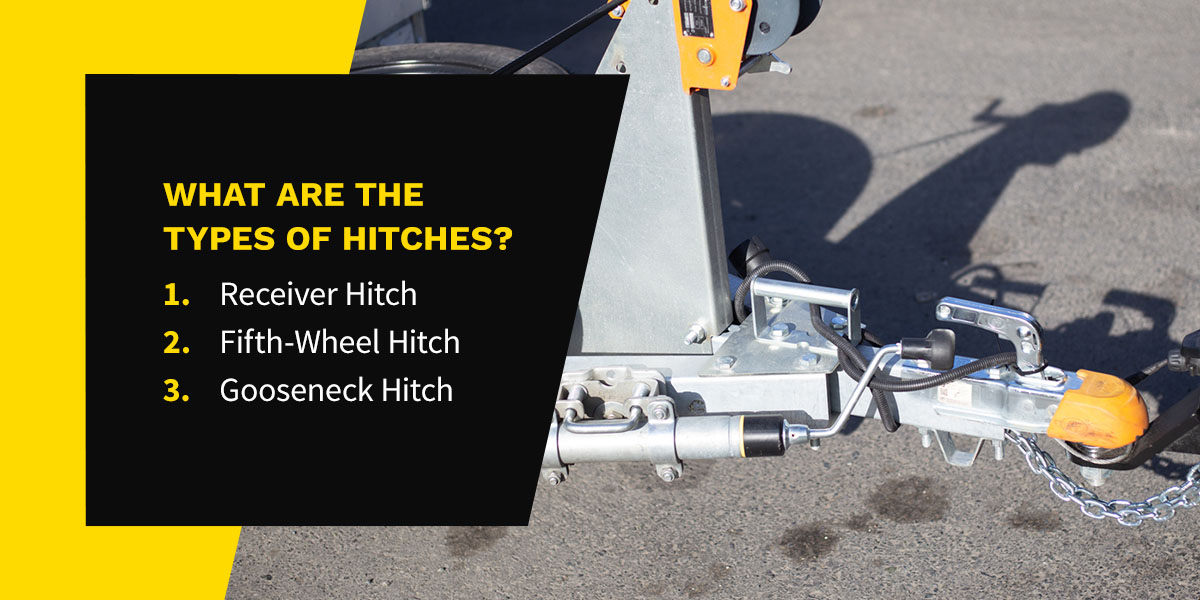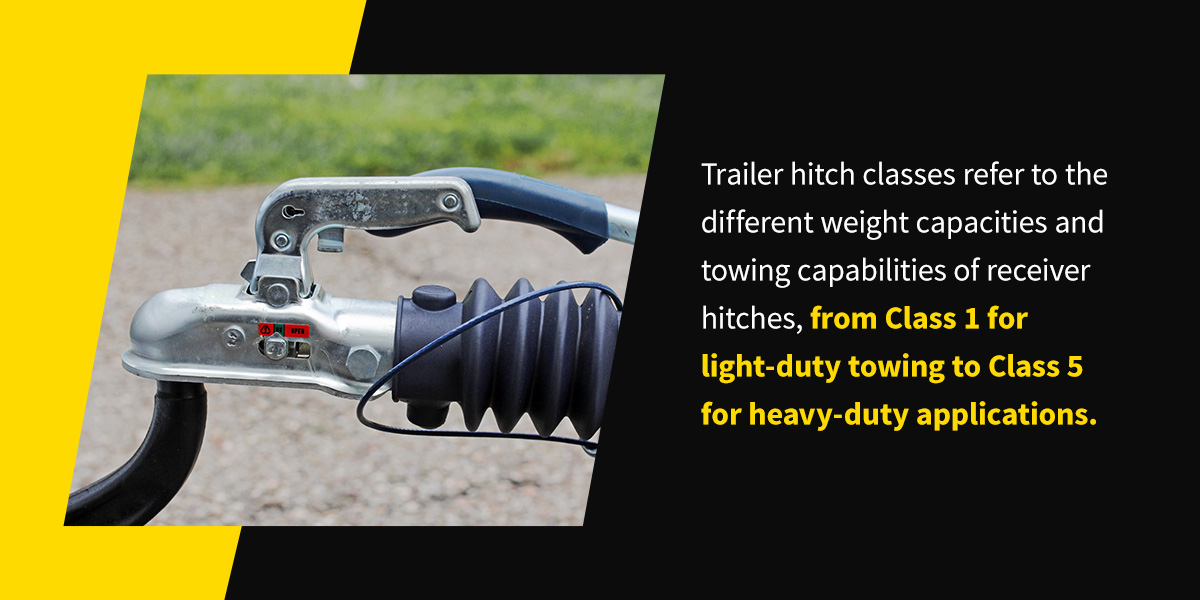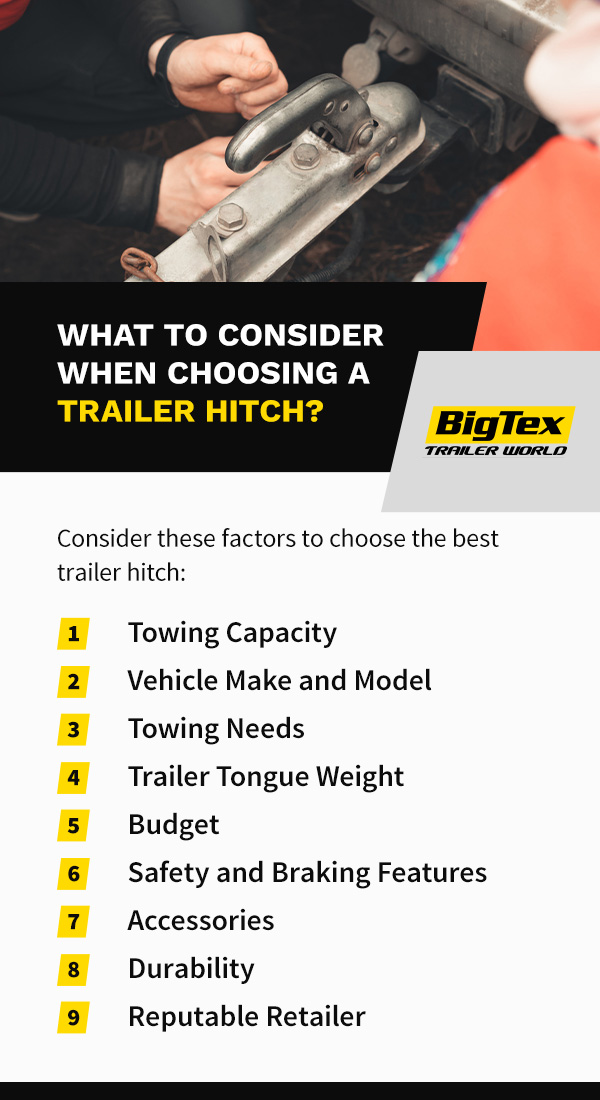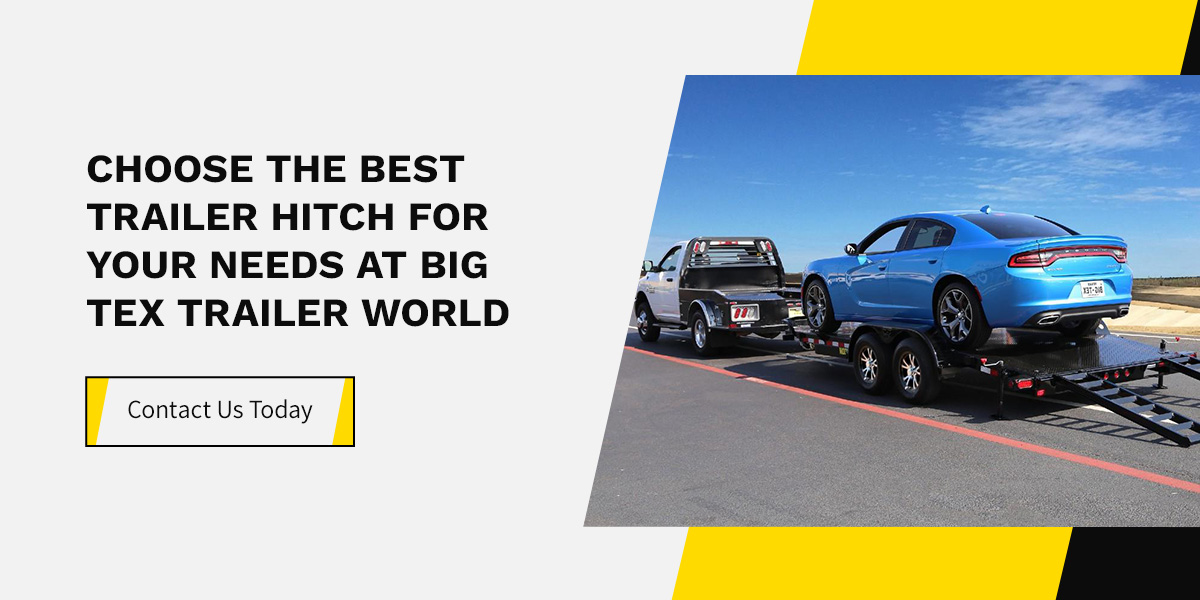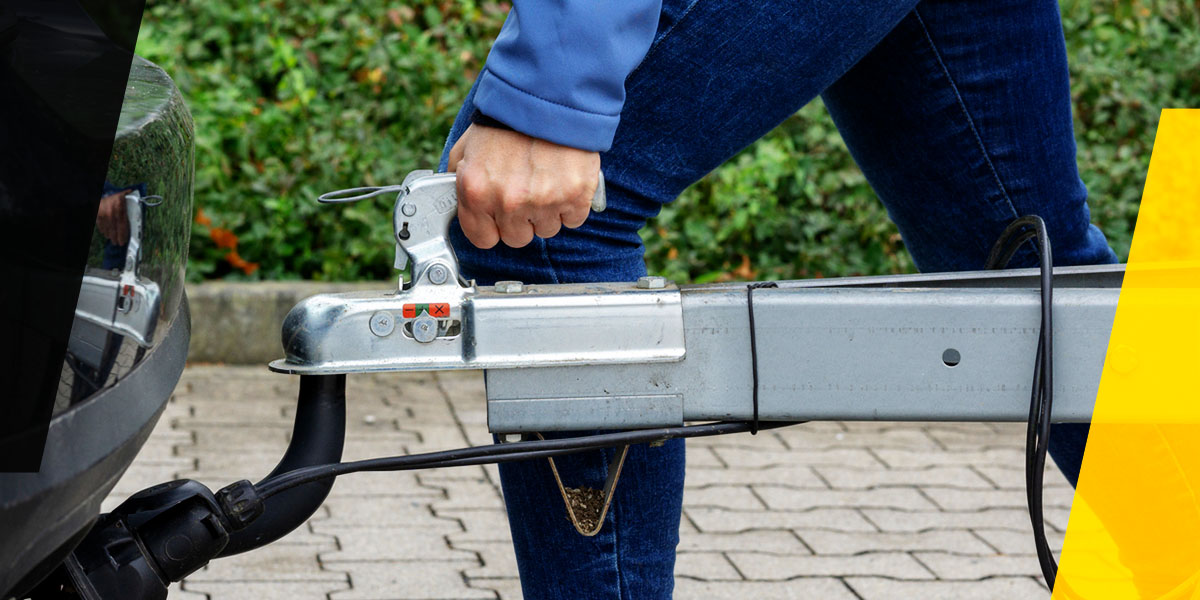
You’ll want to consider a few things before you choose a trailer hitch for your vehicle. From determining your vehicle’s towing capacity to selecting a hitch that seamlessly fits your vehicle’s make and model, the process can be daunting. This comprehensive, easy-to-follow guide can help you choose the best trailer hitch for your vehicle.
Types of Trailer Hitches
There are many types of hitches, each designed for different towing needs and vehicle capabilities. Whether you choose a receiver hitch for general towing, a fifth-wheel hitch for large trailers or a gooseneck for heavier loads, the right hitch will ensure safe, efficient towing experiences.
Here’s a breakdown of three types of trailer hitches to help you narrow your options:
1. Receiver Hitch
A receiver hitch is also known as a tow or trailer hitch. It’s one of the most common types of hitches used to tow campers, trailers and other towable loads. It consists of a receiver tube in various sizes, like 1.25 inches or 2 inches. This type of hitch can also accommodate various accessories, such as ball mounts, bike racks and cargo carriers.
Receiver hitches come in various classes, with Class 1 being the lowest capacity and Class 5 designed for heavy-duty towing. These hitches are highly versatile, easy to install and widely available for several types of vehicle makes and models.
2. Fifth-Wheel Hitch
Fifth-wheel hitches are often used to tow large trailers, like fifth-wheel campers or horse trailers. Typically mounted in the bed of a pickup truck, this type of hitch allows a more stable connection between the vehicle and trailer than traditional receiver hitches. Fifth-wheel hitches use a kingpin and coupler system, allowing the kingpin on the trailer to fit the hitch’s jaw seamlessly. This type of setup offers optimal weight distribution and control, making it highly suitable for towing heavier loads.
Fifth-wheel hitches are popular among RV enthusiasts and those needing to tow substantial payloads while maintaining stability and maneuverability.
3. Gooseneck Hitch
Similar to fifth-wheel hitches, gooseneck hitches are also mounted in the bed of a pickup truck, but they use a ball-and-coupler system for towing. The gooseneck ball is mounted directly onto the truck’s frame, providing a strong and secure connection. These hitches are often used to tow flatbed trailers, livestock trailers and other heavy loads.
Gooseneck hitches offer a tighter turning radius than fifth-wheel hitches, allowing them to maneuver in tight spaces easily. These hitches are ideal for those who frequently tow heavy loads and require a reliable, robust towing solution.
What Are Trailer Hitch Sizes & Classes?
Trailer hitch classes refer to the different weight capacities and towing capabilities of receiver hitches — all classified according to the maximum weight they can safely tow and the tongue weight capacity, or the downward force exerted on the hitch by the trailer. Each caters to different towing needs, from Class 1 for light-duty towing to Class 5 for heavy-duty applications.
Understanding trailer hitch classes can help you choose the right hitch for your needs, whether you’re towing a small camping trailer with the family sedan or a heavy utility trailer with a full-size pick-up truck.
Class 1
Class 1 hitches are designed for light-duty towing and have the lowest weight capacity among the hitch classes. Suitable for towing small trailers and loads like kayaks or cargo carriers, these hitches are typically found on:
- Compact cars
- Mid-size cars
- Full-size cars
- Minivans
- Sedans
- SUVs
Class 1 hitches generally have a towing capacity of up to 2,000 pounds and a tongue weight capacity of up to 200 pounds.
Class 2
Class 2 hitches offer a higher weight capacity than Class 1 Hitches. These hitches are suitable for towing medium-sized trailers and are often used on:
- Full-size cars and sedans
- Mid-size cars
- Minivans
- SUVs
Class 2 hitches offer a towing capacity of up to 3,500 pounds and a tongue weight capacity of up to 350 pounds.
Class 3
Class 3 hitches are among the most popular hitch classes due to their versatility and higher towing capacity. Ideal for larger trailers, like boats, campers and small RVs, Class 3 hitches are typically found on:
- Full-size cars
- Large SUVs
- Minivans
- Trucks
Class 3 hitches typically have a towing capacity of up to 7,500 pounds and a tongue weight capacity of up to 750 pounds. You might use these hitches to tow items like utility trailers, canoes, motorcycles and lawn maintenance equipment.
Class 4
Class 4 hitches are used for heavy-duty towing and are suitable for towing larger and heavier trailers. You’ll likely find these hitches on large SUVs and heavy-duty trucks.
Class 4 hitches typically have a towing capacity of up to 10,000 pounds and a tongue weight capacity of up to 1,000 pounds.
Class 5
Class 5 hitches are the highest-rated class — built for extreme towing capabilities. These are commonly used on heavy-duty trucks and commercial vehicles.
You’ll often find these hitches with a towing capacity of up to 20,000 pounds or more and a tongue weight capacity of up to 2,700 pounds, depending on the hitch model.
What to Consider When Choosing a Trailer Hitch?
Choosing the right trailer hitch means considering a few crucial factors. You’ll want to consider your vehicle’s towing capacity, hitch class, tongue weight and other elements to choose the best hitch for your needs. Choosing the best trailer hitch from a reputable manufacturer is also crucial in enhancing your towing experience and providing peace of mind during your adventures on the road.
Consider these factors to choose the best trailer hitch:
1. Towing Capacity
The most crucial factor in selecting a trailer hitch is determining your vehicle’s towing capacity. Check your owner’s manual or contact the manufacturer to find the maximum weight your vehicle can safely tow before selecting a hitch. Your hitch’s towing capacity must meet or exceed the weight of the trailer you plan to tow.
Selecting a hitch with insufficient towing capacity can be unsafe and increase wear on the vehicle or damage the hitch. At the same time, choosing a hitch with excessive towing capacity might result in higher costs and compromise stability. Ultimately, considering your vehicle’s towing capacity can help you confidently select a hitch that meets your needs and provides a secure and reliable connection between your vehicle and the trailer.
2. Vehicle Make and Model
Ensure that the hitches you browse are compatible with your vehicle’s make and model. Many hitch manufacturers provide fitment guides or online tools to help you find the right type of hitch for your vehicle. Knowing your make and model can help you choose a compatible hitch that fits your vehicle correctly. The best trailer hitch will provide stability without causing unnecessary wear and tear to your vehicle.
Before purchasing, verifying whether your trailer hitch will affect your vehicle’s warranty is essential. Some manufacturers may void the contract if you modify the vehicle.
3. Towing Needs
Select a hitch according to class. As mentioned, each trailer hitch is classified based on its weight capacities. So, if you need a hitch to tow lighter items, you might use a Class 1. In contrast, a Class 5 hitch would best suit larger payloads. Select the hitch that best aligns with your towing needs and your vehicle’s capabilities.
If you plan on traveling, the best hitch for travel trailers will be a Class 3, Class 4 or Class 5, as they allow you to tow larger, heavier trailers safely. Most are also compatible with a weight distribution hitch, which is typically needed for towing travel trailers.
4. Trailer Tongue Weight
The tongue weight, as mentioned, refers to the downward force exerted on the hitch ball by the trailer. You’ll want to ensure the tongue weight is within the specified limits of the hitch you choose and your vehicle. It’s typically recommended to have a tongue weight of about 10%-15% of the total trailer weight for a safe and balanced towing experience. Still, you can consult with professionals to ensure the appropriate tongue weight.
5. Budget
Consider your budget when selecting a trailer hitch. While choosing a quality hitch that meets your towing needs is essential, you can find options that fit various budgets.
The cost of a trailer hitch will vary depending on the size and accessories you get. On average, trailer hitches can cost between $120-$375 for Class 1 to Class 4 hitches, while installation can cost anywhere between $300 to $850.
It’s also helpful to consider your future towing requirements when choosing the best trailer hitch. If you plan to tow various types and sizes of trailers in the future, investing in a heavy-duty hitch now might be beneficial in the long run.
6. Safety and Braking Features
You’ll want to check if your trailer requires a separate braking system to comply with local laws and ensure safe towing. Some states have specific regulations and requirements regarding trailer braking, especially for trailers over a certain weight.
Additionally, look for hitches with safety features like integrated locking mechanisms to secure your hitch better and prevent theft. For enhanced towing stability, you can also consider safety components like anti-sway devices or weight distribution systems. A weight distribution system is ideal for towing heavier loads, as it allows even weight distribution between the vehicle and trailer, ensuring better stability and control while towing.
7. Accessories
When choosing a hitch, consider personal preferences or specific features you might need for your towing needs. Common accessories include:
- Adjustable ball mounts: Ball mounts allow you to adjust the hitch height for different trailer heights. These come in various sizes to match your trailer’s coupler size.
- Anti-sway: These devices minimize trailer sway as you drive, ensuring safer travel.
- Hitch-mounted racks: If you’ll be carrying bikes, cargo or other items, consider hitch-mounted bike racks or cargo carriers to secure these items on your vehicle safely.
- Hitch covers and locks: A hitch cover can protect your hitch when you’re not using it, while locks offer additional security to prevent theft.
Selecting the right accessories can ensure a tailored towing setup, maximizing the benefits of your trailer hitch for your specific towing needs.
8. Durability
Select a hitch from a reputable manufacturer known for producing durable, high-quality products. The best trailer hitch will be well-constructed, ensuring reliable performance and longevity. Customer support is also crucial if you have any questions or concerns about your product.
9. Reputable Retailer
Most importantly, you’ll want to consider a reliable retailer with a vast inventory of high-quality trailer hitches and accessories. Big Tex Trailer World is the leading trailer retailer in the country, and we provide a customer-focused approach to selling and servicing trailers. With more than 60 retail stores nationwide, we sell, rent and service trailers for various industries and applications.
Here are a few benefits of working with us:
- Excellent service: At Big Tex Trailer World, we offer high-quality trailer products and are dedicated to making you a customer for life. Our team is here for you before, during and after the sale to ensure you get the support you deserve. Even if you don’t purchase from us, we service every brand and type of trailer to help meet your needs.
- No hassle promise: We don’t pressure you to buy anything you don’t need or want. We’ll help you find the trailer hitch you need for the best towing experience — while offering expert advice along the way.
- Best selection available: We have the largest selection of trailer parts and accessories anywhere. Our goal is to have what you need when you need it.
- Individualized services: At Big Tex World, we offer a wide range of services to help meet your needs, from customization capabilities to installation and repair services.
- We stand behind what we sell: If you have an issue with your purchase, bring it into any of our nationwide locations, and we’ll get you fixed up and back on the road.
Choosing Big Tex Trailer World means knowing you’re getting a high-quality product from trusted manufacturers. Get expert guidance to help you choose the right hitch for your specific vehicle and towing requirements and reliable servicing for a worry-free towing experience.
Choose the Best Trailer Hitch for Your Needs at Big Tex Trailer World
Consider all the different trailer hitches, accessories and other essential factors before selecting the best hitch for your needs. At Big Tex Trailer World, we can guide you in the right direction. As a reputable industry leader, we offer an extensive selection of hitches and towing solutions from trusted manufacturers. Our expert team will assist you in finding the perfect fit for your specific vehicle and towing needs — with all products meeting high safety and durability standards.
Whether you need a hitch for light-duty towing or heavy-duty applications, we have an affordable solution for you. Browse our products or contact us today to equip your trailer with the best hitch and accessories for a safe, enjoyable towing journey.
